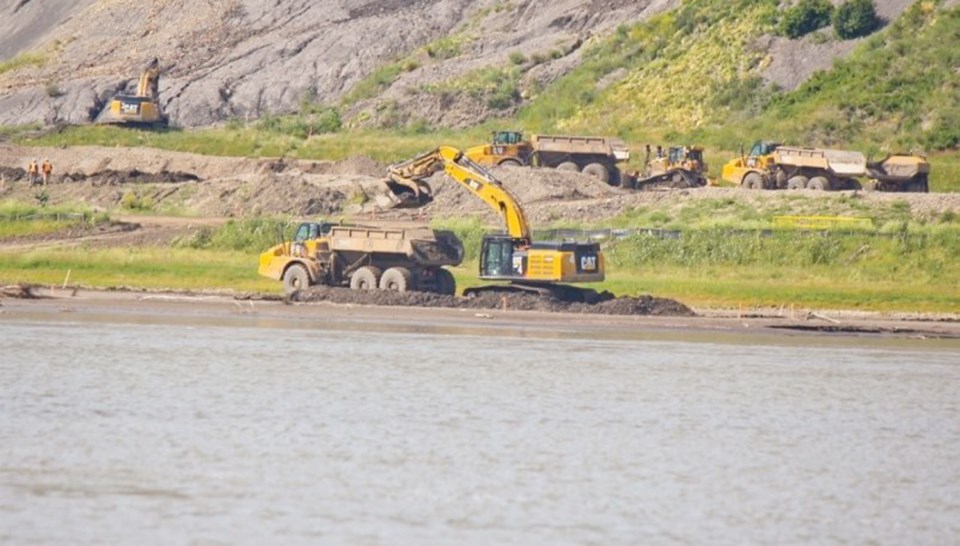Financial troubles are mounting for Petrowest Corporation, one of three main contractors involved in the building of the $8.8-billion Site C dam project.
Over the last number of days, the company has announced it has agreed to be placed into receivership and has received a letter of termination from Peace River Hydro Partners (PRHP) — the international consortium tasked with the $1.75-billion main civil works construction of the dam, including 32 million cubic metres of excavation and the building of a 60-metre high, kilometre-long earth-fill dam.
The company announced Aug. 13 its lenders are seeking immediate repayment of all owed debts on the company's credit facilities, and that its board of directors have agreed to resign when a receiver is appointed.
The company's lenders will be filing an application to put the company into receivership in Alberta court, which is expected to be heard and approved Tuesday, the company said. Ernst & Young is expected to be appointed receiver and will manage the day-to-day affairs of the company.
Company shares could be halted from trading on the Toronto Stock Exchange — listed at nine cents Monday morning — the company added.
The company did not identify how much is owed to lenders in its announcement, and company officials have not returned calls for comment.
Peace River Hydro Partners owed $12.5 million: Acciona
Meanwhile, Petrowest received a notice of termination from the Peace River Hydro Partners agreement on Aug. 11.
Acciona Infrastructure Canada Inc. alleges Petrowest failed to pay its proportionate share of the working capital contributions to PRHP. Those funds cover the costs of the PRHP project’s day-to-day operations on its Site C-related work.
The PRHP partnership is made up of Petrowest, ACCIONA and Samsung C&T Canada Ltd., of which Petrowest holds a 25 per cent stake.
ACCIONA alleges Petrowest defaulted on its contributions to PRHP's working capital fund when Petrowest failed to pay its proportional share of the working capital contributions, valued at $15 million. Petrowest says it has contributed $2.5 million of working capital and was in discussions with PRHP about the remaining balance of $12.5 million.
ACCIONA also alleges each of the following constitutes insolvency:
• Petrowest’s intention to sell a significant part of its assets as disclosed in its interim consolidated financial statements for the three months ended March 31, 2017; and
• The company is unable to pay the accounts of its creditors as they become due as evidenced by the going concern note in the financial statements.
David Austin, associate counsel at Clark Wilson LLP, said it’s too early to tell what kind of impact the termination notice will have on the overall Site C project going forward.
“The question is: why is Petrowest unable to meet its financial obligations to the consortium? $12.5 million on a $1.7 billion contract is not a lot of money,” Austin said.
“Is it indicative of a larger problem with this contract, or a disagreement amongst consortium members?”
Petrowest says it is evaluating the basis for the alleged events of insolvency and default, and will soon be providing a response to ACCIONA.
Officials with Acciona and PRHP confirmed the letter of termination sent to Petrowest, but declined further comment.
"We do not expect this development to impact employment on the project," PRHP spokeswoman Amber Harding said in an email statement.
"However, as with any construction project, the number of workers will vary from month-to-month based on the scope of work being performed."
Company was confident in debt restructure
Petrowest was formed in 2006 in an amalgamation of nine companies in Northeast B.C. and northern Alberta.
In March 2016, Petrowest officials told Alaska Highway News it was confident in being able to restructure its debt with lenders.
The company was working to restructure debt accrued in the 12 months leading up to the award of the Site C contract, the largest in the company's history.
Officials with Petrowest, which also builds oil and gas well pads and access roads, said at the time that it expected to see its share of revenues from oilpatch construction shrink from 35 to 15 per cent in 2016.
Petrowest Chief Financial Officer Lloyd Wiggins said at the time Site C would put the company on a "transformational growth trajectory entering 2016."
Petrowest also held a $7.3-million subcontract to prepare land for the Site C work camp.
The company has announced several waiver extensions by creditors this year.
When announcing its 2016 financial results on March 30, the company said it was negotiating with two lenders for credit facilities that would fund and retire existing bank loans and provide additional working capital, along with the sale of non-core assets.
The company had been renting 60 pieces of equipment to Peace River Hydro Partners for dam related construction work.
When the main civil works contract was announced in November, Premier Christy Clark touted Petrowest's connection to Fort St. John, where CEO Rick Quigley lives.
Quigley was replaced as CEO in May.
—with files from Business in Vancouver



